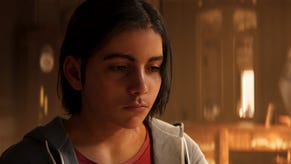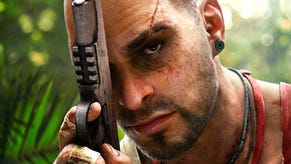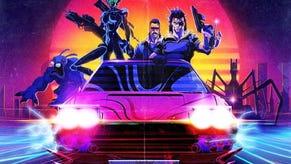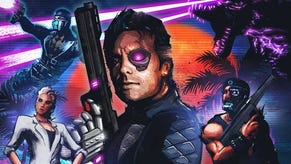The Far Cry 3 approach: damned to die, born to kill
Far Cry 3 is able to survive 2012's FPS crowd with a unique take on action and a brutally simple ideal of the concept of killing. Lead designer Mark Thompson speaks to VG247's Dave Cook.
"We wanted an FPS story that was more personal, something that people could relate to, make a connection with. It isn’t about a global conflict, it isn’t set against the backdrop of military special ops or high stakes espionage. It’s the story of a regular guy, Jason Brody, who is thrown into an insane situation and has to survive, adapt, and learn to fight back so he can save his friends."
VG247: Far Cry 3 has been pushed back to November. What are you looking to achieve with the extra time?
Mark Thompson: Far Cry 3 is a labour of love and we didn’t spend the last three years pouring our hearts into the game to fall short at the finish line. The game is huge. With single-player, the open world, and multiplayer, there's a lot to polish and a lot of finishing touches. The extra time was taken to guarantee we ship a stellar experience.
Some people say there are still too many shooters out there today. What do you feel are the essential ingredients to standing out from the pack and innovating in the genre? How does Far Cry 3 deliver on these ideals?
Far Cry games have always stood out from the pack in the FPS genre. Far Cry 1 was a choice-laden tropical escape from its contemporary linear grey corridors. Far Cry 2 gave players a huge open world with immersive features like fire propagation and unscripted combat. Far Cry 3 champions the foundations laid by previous instalments, embracing player choice, giving a rich open world to explore, supporting the same systemic immersive features fans expect from the franchise. This alone sets us aside from other FPS games, but we also focused a lot on the narrative for Far Cry 3.
We wanted an FPS story that was more personal, something that people could relate to, make a connection with. It isn’t about a global conflict, it isn’t set against the backdrop of military special ops or high stakes espionage. It’s the story of a regular guy, Jason Brody, who is thrown into an insane situation and has to survive, adapt, and learn to fight back so he can save his friends.
There has been a lot of talk around Far Cry 3 as a mature take on the FPS genre. How tricky has it been to make a game based around shooting people with literary and artistic value?
Violence and artistic value aren’t mutually exclusive: it’s more about how honest you are with people regarding the game's core mechanics and the story’s characters. One mistake that games can make is to simply not acknowledge the violence and pretend like it isn’t important, that their protagonist is nonchalantly killing a ton of people. If you ignore what your core mechanics are asking players to do, if you pretend like players aren’t being rewarded for killing, then it will undermine the narrative. If the characters in the game don’t react to the violence performed by the player, then you create a plot hole, one specific to the interactive nature of games.
We addressed this head-on and wrote a story that was about the core mechanic, about killing. It doesn’t judge whether this is right or wrong, it isn’t about creating a morality play. We simply take someone who hasn’t killed before and force them to kill, in order to save their own life and then the lives of their closest friends. Along the way, this killing, the core mechanic, becomes a key theme in the narrative. If it wasn’t, then any literary or artistic value would be undermined by the moment-to-moment gameplay, the story told through the player’s actions.
Can you see Far Cry 3 setting a precedent in terms of narrative weight? Are you expecting outcry or a backlash from the press based on the mature themes in the
story? Are there any particular moments that you feel nervous about ahead of launch?
It has never been a goal to set a precedent in narrative and we aren’t making any claims about advancing the medium or breaking new ground. What we are doing is telling a story the way we want to. And when someone in the room winces at this idea, that probably means it’s stronger than a carefully sanitized and focus-tested concept that will never offend anyone, ever, anywhere.
I think the reaction to what we have shown so far has been based on the fact that Far Cry is a popular shooter brand, and that most other shooters have been treading similar narrative ground for the last few years. In that respect we are absolutely doing something different to the crowd.
The villain Vaas is a rather animated chap. How far is Ubisoft testing itself in terms of acting and direction in Far Cry 3? To what extent has this been a learning
process for you as a developer?
Our ambition for Far Cry 3 was to create realistic characters that give believable performances and create empathy, fear, desire; real emotions. The endeavour has been
driven by technology and creativity.
The reason that characters in Far Cry 3 like Vaas come alive in the game is that we capture the real performance of the actors. Our motion capture technology simultaneously records full body motion, voice, and detailed facial motions. This means our directors and actors work in a much more traditional way, allowing for more chemistry on set and some great improvisation. This wouldn’t be possible with the different elements all being recorded separately and being patched together.
"We take someone who hasn’t killed before and force them to kill, in order to save their own life and then the lives of their closest friends. Along the way, this killing, the core mechanic, becomes a key theme in the narrative. If it wasn’t, then any literary or artistic value would be undermined by the moment-to-moment gameplay, the story told through the player’s actions."
The technology was developed for Far Cry 3 and it has been a learning experience, in fact the tech has informed our creative process. When we saw what was possible with the performances we changed our approach to casting; we made the process more actor-centric, we bring the actor into the process of creating the character from a much less authored starting point than is traditional. We always want to capture a real performance so allowing an actor to be part of the process gets the kind of results you have seen with Vaas, and he is just one element in our cast of insane characters.
When making games more cinematic, developers would typically look to the film industry for inspiration. But are we now reaching a point where this dependency is waning as the games industry grows?
I think it’s natural for any emerging medium to use the conventions established by its predecessors. As we're embracing the strengths of games as a different kind of experience, we are moving on from merely imitating film, and instead drawing from it as a reference like anything else that inspires us.
Cinematic has become something of a dirty word in gaming, conjuring up ideas of heavily scripted, linear, restrictive experiences. This is something that Far Cry as a brand has always been opposed to, and we continue this philosophy for Far Cry 3. Player agency is as important as storytelling, and striking that balance is how we move away from imitating the linear, passive experience of film.
Ubisoft Massive is creating the multiplayer component of Far Cry 3. Can you give us an insight into how multiplayer will handle (load-outs, XP, maps, editor, etc)?
Multiplayer in Far Cry 3 is a huge amount of content, which is why we have Ubisoft Massive as a dedicated multiplayer studio. The multiplayer experience has three main components: PVP with multiple different game modes and a strong team-based component; a four-player co-op campaign independent of the single-player story; and the return of the map editor, allowing players to create and share their own maps.
On top of that we have other community enriching features with web-to-game content that allows players to build their load outs outside of the game through a browser or smart phone. You can also unlock and share in-game rewards through the web based content, and your online profile is consistent across PVP and co-op so gaining XP and rewards will help in all aspects of multiplayer.
There are also social aspects of the single-player campaign that we haven’t revealed yet that will bring out the competitive streak in players.
Far Cry 3 takes place on an island full of hallucinations. The TV show lost did the same. Can I take a guess at a plot twist? They're all dead right?
In the end, it turns out the whole thing was a video game…
Far Cry 3 releases on November 28 in Europe, November 30 in the UK and December 4 in the US.









